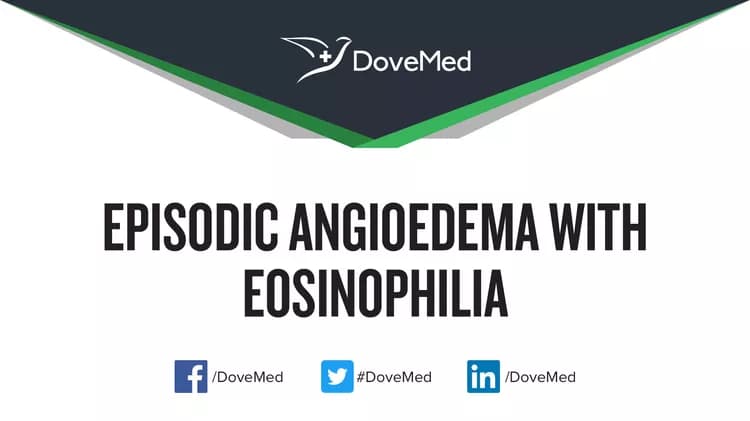What are the other Names for this Condition? (Also known as/Synonyms)
- Gleich Syndrome
- Gleich’s Syndrome
What is Episodic Angioedema with Eosinophilia? (Definition/Background Information)
- Episodic Angioedema with Eosinophilia is a rare and benign condition that presents severe swelling underneath the skin surface (termed angioedema) with concurrent increased white blood cell count (termed eosinophilia). It is also known as Gleich Syndrome
- The other signs and symptoms of the condition may include itchy skin rashes, fever, and rapid weight gain. The cause of development of Episodic Angioedema with Eosinophilia is not well-established. It may be a variant of idiopathic hypereosinophilic syndrome. The condition is known to have periods of remissions and recurrences.
- In many individuals, treatment may not be necessary for the condition as it can be self-limiting. However, when necessary, the condition may be managed using steroid therapy and symptomatic treatments. In a majority, the prognosis of Episodic Angioedema with Eosinophilia is typically good
Who gets Episodic Angioedema with Eosinophilia? (Age and Sex Distribution)
- Episodic Angioedema with Eosinophilia is a rare disorder, and the presentation of symptoms may occur at any age
- Both males and females may be affected
- Worldwide, individuals of all racial and ethnic groups may be affected
What are the Risk Factors for Episodic Angioedema with Eosinophilia? (Predisposing Factors)
- Currently, no risk factors have been clearly identified for Episodic Angioedema with Eosinophilia
It is important to note that having a risk factor does not mean that one will get the condition. A risk factor increases one’s chances of getting a condition compared to an individual without the risk factors. Some risk factors are more important than others.
Also, not having a risk factor does not mean that an individual will not get the condition. It is always important to discuss the effect of risk factors with your healthcare provider.
What are the Causes of Episodic Angioedema with Eosinophilia? (Etiology)
- Presently, the exact cause of development of Episodic Angioedema with Eosinophilia is not well-understood
- The disorder is categorized as a subtype of idiopathic hypereosinophilic syndrome, but with no internal organ involvement noted
What are the Signs and Symptoms of Episodic Angioedema with Eosinophilia?
The signs and symptoms of Episodic Angioedema with Eosinophilia may include:
- Presence of angioedema or swelling of the lower skin layers that is episodic, meaning with alternating symptoms and symptom-less periods
- Eosinophilia - increased eosinophils in blood (a type of white blood cells), which is noted every 3-4 weeks
- Urticaria (hives)
- Fever
- Weight gain that may be rapid
How is Episodic Angioedema with Eosinophilia Diagnosed?
Episodic Angioedema with Eosinophilia is diagnosed on the basis of the following information:
- Complete physical examination and thorough medical history evaluation
- Assessment of the presenting signs and symptoms
- The following tests may be performed:
- C1 inhibitor blood level
- Complement component C2 and C4
- Specialized blood tests for elevated levels of eosinophils
- Dermoscopy: It is a diagnostic tool where a dermatologist examines the skin using a special magnified lens
- Wood’s lamp examination: In this procedure, the healthcare provider examines the skin using ultraviolet light. It is performed to examine the change in skin pigmentation
- Skin biopsy: A skin tissue biopsy is performed and sent to a laboratory for a pathological examination. The pathologist examines the biopsy under a microscope. After putting together clinical findings, special studies on tissues (if needed) and with microscope findings, the pathologist arrives at a definitive diagnosis
A differential diagnosis may be necessary to eliminate other conditions that present similar signs and symptoms. These may include malignancies, allergic conditions, and connective tissue disorders.
Many clinical conditions may have similar signs and symptoms. Your healthcare provider may perform additional tests to rule out other clinical conditions to arrive at a definitive diagnosis.
What are the possible Complications of Episodic Angioedema with Eosinophilia?
The complications of Episodic Angioedema with Eosinophilia may include:
- Episodic weight gains that may be up to 18% of an individual’s body weight
- Increased white blood cell count (eosinophils, neutrophils, and lymphocytes)
- The condition can lead to depression and low self-esteem
- Remission and recurrence of the condition
Complications may occur with or without treatment, and in some cases, due to treatment also.
How is Episodic Angioedema with Eosinophilia Treated?
Generally, no treatment is necessary for Episodic Angioedema with Eosinophilia.
- If there is a severe episode of the disorder, steroid treatment may be recommended to reduce the severity of symptoms
- Regular medical screening at periodic intervals with tests and physical examinations are recommended
How can Episodic Angioedema with Eosinophilia be Prevented?
Presently, the risk factors and cause of Episodic Angioedema with Eosinophilia are not known. Thus, there are currently no guidelines or methods available for its prevention.
What is the Prognosis of Episodic Angioedema with Eosinophilia? (Outcomes/Resolutions)
- The prognosis of Episodic Angioedema with Eosinophilia is generally favorable, as it is considered a benign condition and no major organ involvement is noted
- The condition is known to resolve spontaneously. But, in some cases, individuals are known to go into remission for several years before episodic attacks recur
Additional and Relevant Useful Information for Episodic Angioedema with Eosinophilia:
The following DoveMed website link is a useful resource for additional information:
Related Articles
Test Your Knowledge
Asked by users
Related Centers
Related Specialties
Related Physicians
Related Procedures
Related Resources
Join DoveHubs
and connect with fellow professionals



0 Comments
Please log in to post a comment.